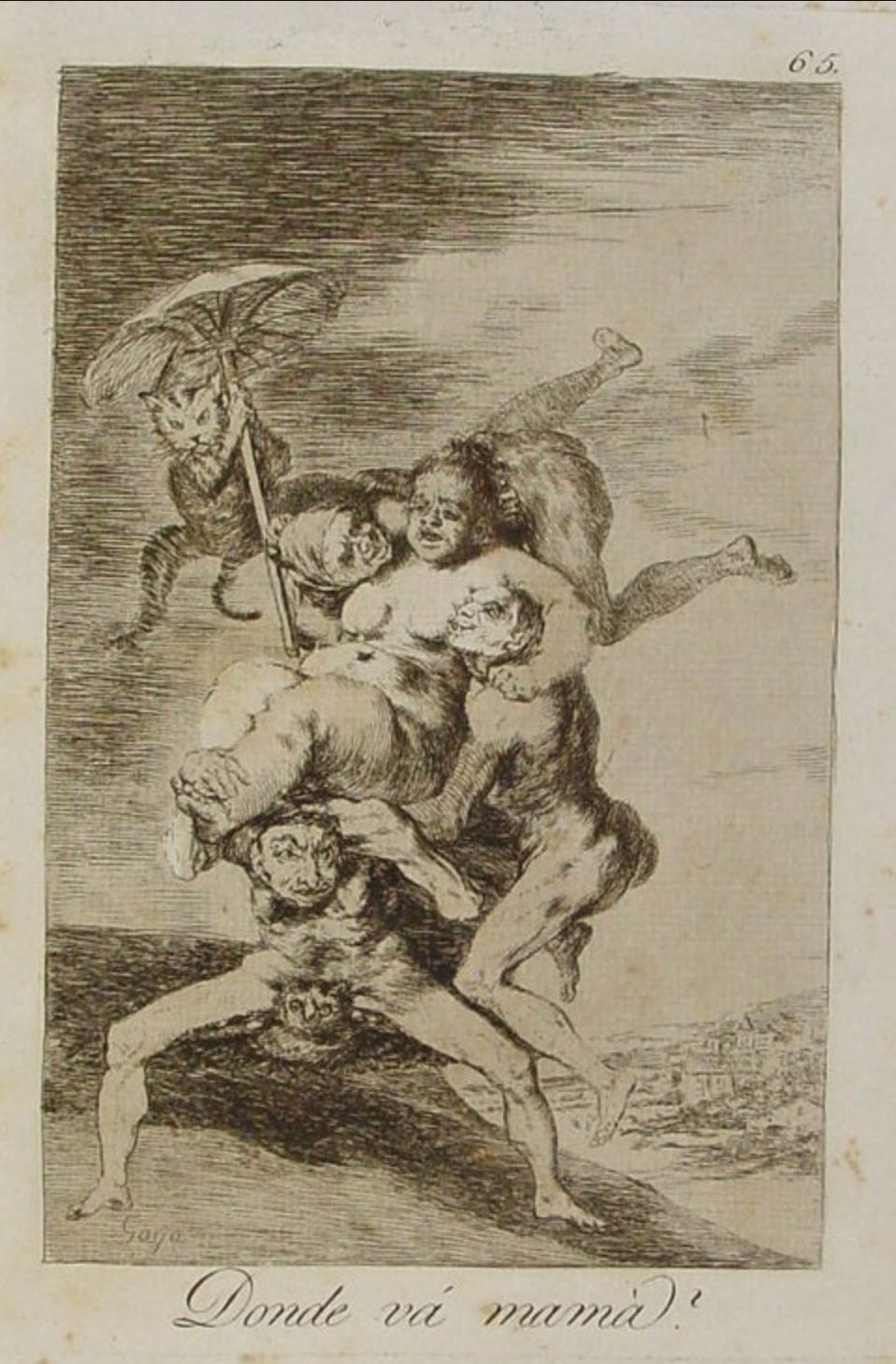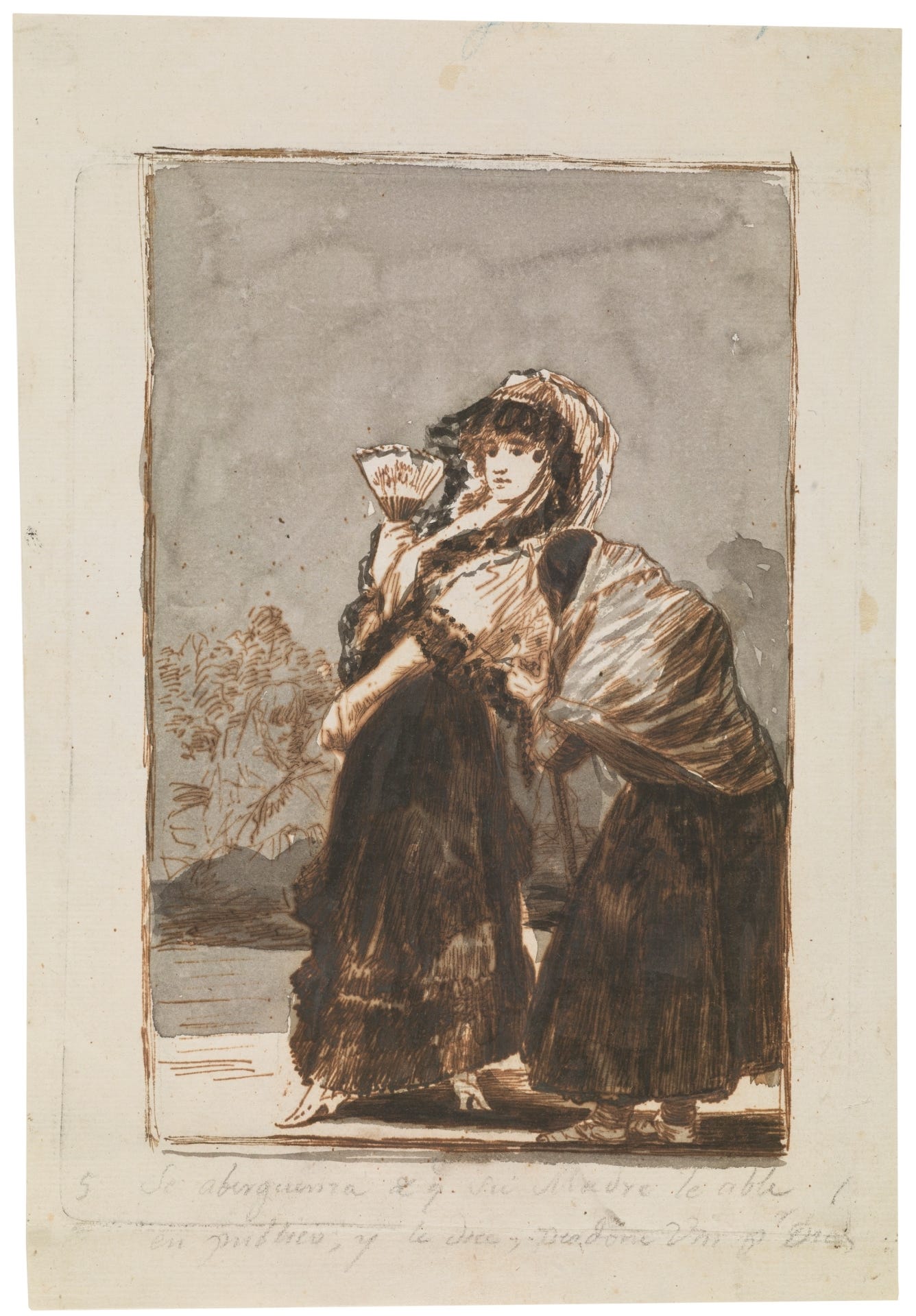1.
He had always been somewhat afraid of her. In a letter to Martin: “She is finely developed and jealously independent, reluctant to take unreasonable service with her employees.” He tried to kiss her once, out of gratitude. She stiffened at the approach of his face and pulled back.
He did a painting of her black grandfather, surrounded by menacing dogs and dead English soldiers. She refused it. She also refused to respond to Juanita, the diminutive of her name.
She had no children that he knew of. He thought of her as a daughter. She thought of him as a daft old man. He taught her to draw, grind colours, mix paints, prepare and prime canvases, and fill in base colours.
Her portrait of him shows him squatting naked, with the thorax and legs of a toad.
2.
Three days before, Juana had laid and pumiced the second layer of red priming for the ground – the first layer had been laid three months before – and this morning, she transferred the sketches of the king and queen’s faces onto it. Then, for four hours, she stood in for the queen while Goya filled in the dress and jewellery.
When he finished, she took off the headdress, the Order of the Starry Cross sash, the medallion, the necklace, the earrings, and the rings. Each was taken in the gloved fingertips of the queen’s attendant as if her touch had ruined it.
Goya and Ramon winched her up and out of the brocaded dress. Back on the ground, she ducked under the farthingale’s whalebones. The hoops were wider than her outstretched arms.
Naked, her third month. She slipped back into her linen shift.
What was left? The arms, which an assistant would start. The silver-buckled shoes, which Goya would paint. She eyed the rest critically. The dress’s gold lace collar was deftly executed. As was the silver and gold trim. For the folds and highlights and the trim’s braid and frills, Goya had applied lead white with a reed pen in short, curved strokes. The long gold necklace was the last element added, a single twisting stroke, executed in seconds, that could have undone all the work if it faltered. Juana drew a breath, amazed he could still surprise her.
Then he removed it. Along with the sash and the rings. The fisherman and his wife after a big catch. That was his title for it.
The fingers were too cylindrical and stubby, like half-stuffed sausages. She found the palette and the brushes and returned to the easel to fix them. Goya bellowed at her.
3.
Later, after he calmed down, she looked over his shoulder at what he was working on, a drawing, with a brush, in black iron-gall ink, of a fat naked woman, who slightly resembled the queen – “deformed by dropsy,” said Goya. Naked demon-men were holding her aloft: one sucked contentedly at her breast; a second was wrapped around her, cradling her head tenderly with his left hand and grinding his groin into the back of her skull; the third, splay-legged on the back of a giant-winged owl, held up the bulk of her swollen mass in his stretched-out arms. A cat holding a parasol hovered above the group, protecting it from the sun’s rays. A city was down below, far off in the distance. “Donde va mamá?” is written at the bottom of the sheet.
“Whose mama, yours?” she asked.
Goya laughed. “I’m not sure,” he said.
She looked at it for a moment longer. Goya, sensing her, rustled through some sheets and pulled out a sketch of a young woman with a fan gazing out at the viewer, ignoring the old crone next to her, clutching a rosary and begging for alms.
Juana read the title under the drawing: “God forgive her. And it was her mother.”
“She’s her daughter,” he said, “and she’s gone off and become a rich woman by marrying someone, or by selling herself, or by doing both, and she doesn’t recognise her poor mother. Something like that.”
He opened his Conversation Book and read aloud what Moratín suggested. “The young lady left home at a very young age: she did her apprenticeship in Cádiz, then came to Madrid, where she won the jackpot. She goes down to the Prado and hears a filthy, decrepit old woman begging for alms; she pushes her away, the old woman insists: the fancy lady turns round and realises - who knew? - that the poor woman is her mother.”
Juana didn’t say anything.




